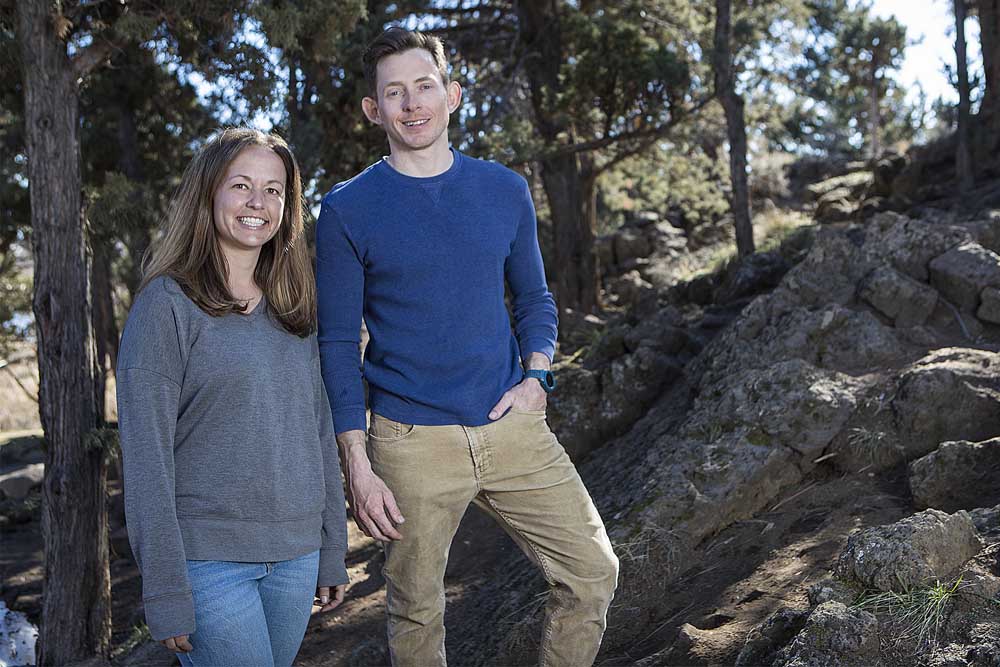Business courses accelerate child care program openings
Published 4:00 am Sunday, February 13, 2022

- Kendal Sweeney and Ryder Talcott plan to open a 16-slot outdoor preschool in Bend this fall, combining Talcott’s background in the outdoor industry with Sweeney’s experience as a preschool teacher.
Ryder Talcott and Kendal Sweeney are close to opening an outdoor preschool in Bend, but the journey has been a long one.
The pair plans to open a 16-slot outdoor preschool in Bend in the fall, combining Talcott’s background in the outdoor industry with Sweeney’s experience as a preschool teacher.
The idea behind Maverick Outdoors is exactly what it sounds like: Kids will spend all four hours each day outside, rain or shine, playing and learning about the outdoors. The first classes will be just morning preschool-aged sessions, but the pair plans to expand to afternoon sessions for school-aged kids to fill gaps in the child care schedules of working parents.
“There are so many benefits of being outside,” Sweeney said. “Getting their hands in the dirt can be beneficial. Spending 15 minutes in the sunshine can be beneficial.”
The couple have been thinking about developing an outdoor preschool since 2017, when they met a family hiking with their 1-year-old through the Appalachian Trail and wondered what it takes to get kids outdoors at young ages, but they credit a program from the Central Oregon Community College Small Business Development Center with helping to turn their idea into a business plan and getting them off the ground months or years sooner.
The Center’s Early Childhood Education Business Accelerator has been offering free 12-week business courses and $5,000 in funding for early-stage, in-home child care businesses since the program’s first cohort last fall.
“The course touched on many things that we were aware of that we needed to iron out for our business, but that we hadn’t done yet. It really helped us to understand specifically how certain areas, like accounting, like risk management, whatever it may be, applied to our specific situation,” Talcott said.
Without the course, Talcott and Sweeney believe they would’ve had to wait until next year to open.
“We’ve definitely had a lot more energy around it ever since getting into the program, so I feel like it’s definitely coming together more quickly than it would have otherwise,” he said. “This course just gave us the extra step forward in order to operate earlier.
Sweeney and Talcott were two of the 10 participants in the accelerator program’s fall cohort. Of those 10, seven have launched businesses, and program leaders hope the first three cohorts of the program will help get child care slots for 250 children into the region, according to SBDC Director Ken Betschart.
The program is free to participants, who attend six biweekly class sessions and meet one-on-one with Lisa Tynan, the instructor of the program, for personal business coaching on the topics discussed in the course.
Once participants complete the program, they get a free year of software designed for in-home child care businesses to streamline marketing, enrollment and fee collection tasks. Once they complete their state certifications, the SBDC grants them $5,000 in seed funding to help with their launch, too.
One of the central topics is the basic math of any business: Evaluating the actual cost per enrolled child and setting sustainable rates to charge.
Those interested in joining the spring cohort of the SBDC’s accelerator program can still register.
Classes, available in English or Spanish, take place once every other week, with business coaching sessions on off-weeks.
Those interested in participating can contact Denise Hudson at NeighborImpact for more information: deniseh@neighborimpact.org.
“All these providers have hearts of gold, they are doing this because they love children, and the heart is in the right place,” Tynan said. “But they are doing themselves a great, great disservice if they’re not paying themselves a living wage. They’re not able to grow, they’re getting burnt out, the quality of the program goes down, so we want the opposite to happen.”
The program’s second cohort started last month with 23 participants enrolled — 12 English speakers and 11 Spanish speakers, who will take the courses using materials translated into Spanish.
The third group starting this spring will be the last that’s funded by Deschutes County and the city of Bend as part of a pilot program, but Betschart is hopeful the program will prove its success and get funding for future years and serve as a model for similar programs statewide.






